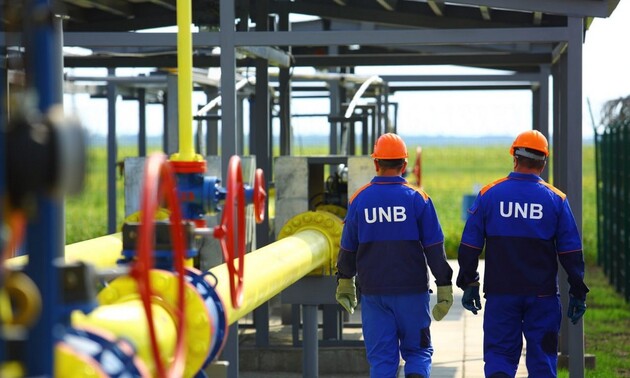Ukraine Stops Gas Production at a Large Field... by Decision of a Ukrainian Court: Explainer
In Kharkiv region, 50 kilometers from the frontline, a large gas field has recently stopped working.
No, daily shelling of the area by Russians has nothing to do with it yet – we have succeeded without them. The situation is tougher here, the fight for money is in full swing. The Sakhalin field is a tasty morsel; its 15 billion cubic meters of gas very close to Kharkiv was attractive to many.
At the beginning of the century, the field was intended to become a model of privatization – so much so that even a Polish state concern was involved to make it happen. The British followed suit.
It did eventually become a model – the fight was revealing. First things first, the government of the home country was removed from the sinecure. That said, Mykola Zlochevskyi, who was also briefly involved in the matter, once even served as minister.
For lawyers, on the contrary, the sinecure has been open for decades, and those who snatched a coveted piece right away were too numerous to count.
For example, the Ukrnafta company, which just became owned by the Privat Group for the next two decades, sought to get the field almost entirely, but it didn’t work out. The competitors were no country bumpkins either.
After a protracted, multi-year struggle, Ihor Kolomoiskyi finally managed to gain control over the the Ukrnaftoburinnia Mining Company (UNB) that operated at the field. Not without sharing stakes and profits though.
By 2015, a triumvirate of Ihor Kolomoiskyi (as the main shareholder), Vitalii Khomutynnik and the Kharkiv-born Russian Pavlo Fuks had formed on a gas patch of 30 square kilometers lying under fields and crops. A small 10% stake in the Poltava Gas and Oil Company (PGOC), a subsidiary of the British JKX Oil&Gas, also survived there. Although Mr. Kolomoiskyi also raked it in for himself with varying degrees of success. Besides, in “Sakhalinka” itself, they basically had three joint venture companies.
Oddly enough, all this mishmash was beneficial to the gas field.
The “pack of comrades” carefully watched each other’s moves, not allowing the partners to become too impudent. Unlike Ukrnafta, which was carved up by those parasitizing on the remnants of the Soviet legacy under authorities of all shades (oil production fell by half and gas production shrunk threefold), things were going well at the Sakhalin field.
This was partly thanks to the fact that there wasn’t much to carve up there initially, so one had to make investments in order to reap benefits. And it worked: the field developed well. From 2015 to 2019, production increased from 440 million cubic meters to a peak of 860 million. Moreover, at the UNB itself, the growth tripled – from 237 million to 735 million cubic meters.
Then production volumes decreased slightly, but remained confidently around 700 million cubic meters per annum. This is almost two-thirds of what remains of Ukrnafta’s gas production, which has not one, but 80 fields. Revenue from sales of what was mined at Sakhalinka in the pre-war year reached UAH 13 billion.
After Poroshenko’s presidential tenure ended, the composition of the owners of the field began to change. Pavlo Fuks was the first to leave the company, selling his stake in 2018. On the eve of the war, Khomutynnik also left. They all complained bitterly about how little they received when they parted, but the value of their severance pay amounted to hundreds of millions of dollars. The company itself is now estimated to be worth about $600 million.
At the beginning of 2022, Ihor Kolomoiskyi was left in proud solitude. Shortly after, February 24 came. Battles on the frontline were raging very close, hostilities were taking place nearly the not-so-distance city of Okhtyrka.
But the gas field worked, albeit with great problems. At the end of 2022, production fell by 40%. This was mainly due to the fall in demand... there was simply no one in industry to sell gas to.
But the recession did not interfere with development; well construction continued at the field. A new booster compressor station was even being built (almost two-thirds of the original underground reserves had already been extracted).
Meanwhile, relations between Kolomoiskyi and Zelenskyy deteriorated sharply, which, among other things, led to a sudden opening of the eyes of a bunch of law enforcement officers. The time for “drinking coffee” is over.
The government remembered that it had a controlling stake in Ukrnafta, and even with the help of the Ministry of Defense, which was slightly freaked out by what was happening (everything was done on its behalf), brought it back under its control. For the first time in twenty years, the country had the opportunity to understand what was happening in the company and finally begin to manage it. It turned out well: state revenues increased sharply. And although the heart-rending outcry around the process rose to the skies, on the whole, the takeover of control from Privat turned out to be successful.
In May, the already state-owned Ukrnafta was handed over to the management of the Ukrnaftoburinnia company. But an attempt to repeat the success story was a failure. Although the asset was quite workable.
Many were opposed to it, including the Poltava Oil and Gas Company. There were a lot of appeals to all kinds of authorities, even the US embassy. They fell on deaf ears. The decision remained in force, and PGOC urgently began to withdraw Kolomoiskyi’s structures from among the shareholders to the British Virgin Islands to avoid trouble.
The transfer option, even if untidy, seemed necessary. Right before your eyes is the example of Novinskyi’s gas assets (Smart-Holding), where 390 million cubic meters were produced per year. The wells there were taken away... after which production stopped. Already in the first half of the year, the UNB reported 700 million UAH of profit (mostly thanks to the merits of the predecessors), promising to triple it in the second half of the year.
And then came yet another episode of “Wonderland”…
In August, the UNB filed another lawsuit against the State Service of Geology and Mineral Resources to expand the site. The fact is that the case is a routine one; as was already mentioned, the company’s lawyers literally live in the courts for years.
The response to some appeals and decisions of various types of courts, including the Supreme Court, sometimes drags on for years. And it happens that in 2023 the decisions of 2009 are overruled.
I deliberately avoid mentioning who had the upper hand and how the matters were discussed. The reputation of the Ukrainian judiciary in corporate conflicts is so pure and unclouded that those who can have long had their legal proceedings handled in London.
A summary of what was happening was described slightly cynically by one of the participants:
“The license has been in litigation for decades (since 2004 — I.M.), and Ukrnaftoburinnia under Kolomoiskyi invariably won in all disputes. But when he was pushed aside (having appointed a new manager — I.M.), the lawyers suddenly lost the case. They were not able to come to an agreement. It happens. Let them think.”
It seems that within Ukrnafta itself there are now interesting discussions going on about who should think about what. Its new head, Serhii Koretskyi, has already said that critical information flows from all the cracks from the company.
But the fact remains that the company’s production license is gone. Moreover, de jure it cannot be restored.
The rest is the legal documentation of what happened. Ironically, it's called a "reversal of the court's decision." Well, that’s quite a reversal.
In fact, an abrupt cessation of production is a controversial issue, and one could resist. However, they are already digging with an excavator at the new head of Ukrnafta Koretskyi (too many respectable people have suddenly lost little pleasant things). So there will be a lot of people wanting to charge him with a crime for illegal mining. And without a license, mining automatically became illegal. Naturally, three days later the UNB suspended it.
To understand the scale: this winter alone, the output of the field would have been about 170 million cubic meters of gas, which is not at all superfluous to us.
What's next? The UNB filed the case for cassation with the Supreme Court. And the Asset Recovery and Management Agency stated that it would wait until the Supreme Court decides on the final loss of the special permit to terminate contracts for the management of Ukrnafta.
Judges are offered a reputationally advantageous way out of the situation – to admit that they simply did not read the documents and accidentally canceled the “wrong” thing. They say that we were talking about another special permit, and it concerned a completely different special permit, which, moreover, was canceled back in 2019. That’s how it is.
Don't laugh, it's normal. Our judges can admit this (such cases have happened repeatedly). But provided that something greatly outweighs the incentives and arguments – notably those that inspired them just a week earlier.
And about the sacred. It is currently planned to create an interdepartmental working group of officials and independent experts. The goal is to ensure compliance with the terms of the contract and the receipt of income into the state budget.
Well, how can we possibly do without a working group? The idea “if you want not to be responsible for anything, create a working group” has long been hardwired into the subcortex.
And in the background, fifty kilometers away, is a forgotten war... The country has a pronounced deficit of gas for the winter and a huge ambition to cease its imports.
At least, now it has a “new reversal”!
Read this article in Ukrainian and russian.
Please select it with the mouse and press Ctrl+Enter or Submit a bug












 Login with Google
Login with Google